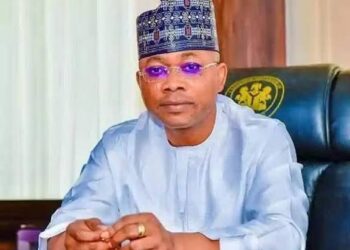The Revenue Mobilisation Allocation and Fiscal Commission has announced plans to review the salaries of Nigeria’s political office holders, citing concerns that current compensation levels are unreasonably low and have remained stagnant since 2008.
RMAFC Chairman Mohammed Shehu revealed at a press briefing in Abuja on Monday that President Bola Tinubu currently earns just ₦1.5 million monthly, while ministers receive less than ₦1 million per month, describing these figures as inadequate for a nation with over 200 million people.
“You are paying the President of the Federal Republic of Nigeria ₦1.5m a month, with a population of over 200 million people. Everybody believes that it is a joke,” Shehu stated during the briefing.
The RMAFC boss highlighted significant disparities in government compensation, noting that Central Bank governors and some agency directors-general earn ten to twenty times more than the President and Attorney-General respectively. He argued that such imbalances create unrealistic expectations for political office holders to perform optimally without adequate compensation.
“You cannot pay a minister less than ₦1m per month since 2008 and expect him to put in his best without necessarily being involved in some other things,” Shehu explained, suggesting that low salaries might inadvertently encourage corruption.
However, the Nigeria Labour Congress has strongly opposed the proposed salary increases, arguing that the plan ignores the country’s worsening inequality and overlooks the hidden perks that already supplement government officials’ earnings.
Shehu clarified that RMAFC’s constitutional mandate covers only political, judicial, and legislative office holders, including governors, senators, ministers, and agency heads, but excludes civil servants and public sector workers whose minimum wage falls under different authorities.
Despite anticipated public resistance to politician pay increases, the chairman emphasized the need for realistic remuneration that reflects the responsibilities of high office. “It’s about time that people like you and others should support the commission to come up with reasonable living salaries for ministers, DGs, and the President,” he told reporters.
Beyond salary reviews, Shehu announced that RMAFC has initiated a comprehensive review of Nigeria’s vertical revenue-sharing formula, which has remained unchanged since 1992. The current allocation gives the Federal Government 52.68 percent of federally collected revenues, while states receive 26.72 percent and local governments get 20.60 percent.
An additional 4.18 percent is reserved for special purposes, including one percent each for the Federal Capital Territory and ecological funds, 1.68 percent for natural resources development, and 0.5 percent for stabilization.
“In line with this constitutional responsibility and in response to the evolving socio-economic, political and fiscal realities of our nation, the Commission has resolved to initiate the process of reviewing the revenue allocation formula,” Shehu declared.
He cited recent constitutional amendments that have expanded state government fiscal responsibilities as justification for the review, arguing that the current structure needs adjustment to promote economic growth and reduce state dependence on federal allocations.
The commission had previously attempted to modify the formula in 2022 under former Chairman Elias Mbam, recommending 45.17 percent for the Federal Government, 29.79 percent for states, and 21.04 percent for local governments. However, the Muhammadu Buhari administration never implemented these proposals.
The revenue-sharing formula has remained a contentious issue in Nigerian politics since before independence in 1960, with various regions and states advocating for adjustments that would benefit their specific circumstances. Political considerations and the Federal Government’s reluctance to reduce its substantial allocation have historically hindered reform efforts.



















